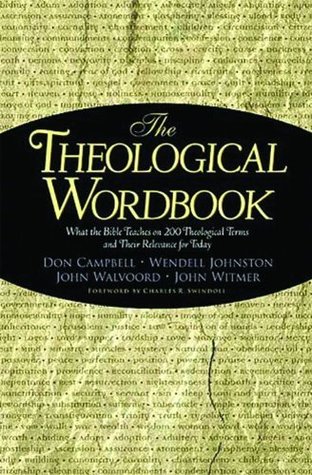- Bible
- Read the Bible
- Bible Versions
- Verse of the Day
- Reading Plans
- Verses by Topic
- Books of the Bible
- Bible Images
- Study
- Commentaries
- Concordances
- Dictionaries
- Encyclopedias
- Sermons
- Bible Atlas & Maps
- BP Wiki
- Devotionals
- Today's Devotionals
- Light of the World
- All Devotionals
- Inspirational Quotes
- More
- Picture Quotes
- Videos
- Inspirational
- Bible Study
- What The Bible Says
- Bible Q&As
- Daily Bread
- Bible by Genre
- Bible Stories
- Random Bible Verse
- Community
- Store
Theological Wordbook (Swindoll Leadership Library)
Stimulating theology is an oxymoron for most people. "Theology" sounds like something for the severely intellectual, full of complicated ideas that escape the typical Christian reader.
Stimulating theologyStimulating theology is an oxymoron for most people. "Theology" sounds like something for the severely intellectual, full of complicated ideas that escape the typical Christian reader.In reality, theology is meant to enhance our understanding of God. Most of the words that make up the Christian vocabulary are common words, drawn from the realities of life, and therefore are easily applicable to real life. Based on this premise four leading authors have come together to create this excellent volume.
In reality, theology is meant to enhanceenhance our understanding of God. Most of the words that make up the Christian vocabulary are common words, drawn from the realities of life, and therefore are easily applicable to real life. Based on this premise four leading authors have come together to create this excellent volume.The Theological Wordbook tackles tough words, such as propitiation, regeneration, righteousness, and predestination, but it does so in a natural, plain-spoken manner designed to be enlightening rather than evasive. Also literally dozens of words you are likely to use every day, such as forgiveness, mind, peace, rest, family, truth, and guilt, have profound biblical value. Using The Theological Wordbook can enable you to more fully appreciate what the Bible teaches on these crucial topics and how each of these terms is relevant for life today.
The Theological WordbookThe Theological Wordbook tackles tough words, such as propitiation, regeneration, righteousness,propitiation, regeneration, righteousness, and predestinationpredestination, but it does so in a natural, plain-spoken manner designed to be enlightening rather than evasive. Also literally dozens of words you are likely to use every day, such as forgiveness, mind, peace, rest, family, truth,forgiveness, mind, peace, rest, family, truth, and guiltguilt, have profound biblical value. Using The Theological WordbookThe Theological Wordbook can enable you to more fully appreciate what the Bible teaches on these crucial topics and how each of these terms is relevant for life today.As this happens, your understanding of God will expand. And as the words you use, speak, and hear in the community of faith become more familiar, you will become more connected to your own spiritual heritage.
As this happens, your understanding of God will expand. And as the words you use, speak, and hear in the community of faith become more familiar, you will become more connectedconnected to your own spiritual heritage.The Theological Wordbook is the link between understanding God's Word in your head and accepting it in your heart.
The Theological WordbookThe Theological Wordbook is the link between understanding God's Word in your head and accepting it in your heart.BUY NOW
Published October 19th 2000 by Thomas Nelson (first published October 17th 2000)

John F. Walvoord (May 1, 1910 - December 20, 2002) was a Christian theologian, pastor, and president of Dallas Theological Seminary from 1952 to 1986. He was the author of over 30 books, focusing primarily on eschatology and theology including The Rapture Question, and was co-editor of The Bible Knowledge Commentary with Roy B. Zuck. He earned AB and DD degrees from Wheaton College, an AM degree from Texas Christian University in philosophy, a ThB, ThM, and ThD in Systematic theology from Dallas Theological Seminary, and a LittD from Liberty Baptist Seminary.
In addition to his responsibilities at the seminary, Walvoord earned a reputation as one of the most influential dispensational theologians of the twentieth century and played a prominent role in advocating a rapture of Christians from the earth prior to a time of great tribulation, followed by a literal thousand-year millennial reign of Christ, and a renewed focus of God on the nation of Israel as distinct from the church.
... Show more